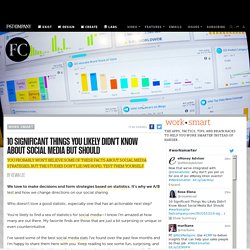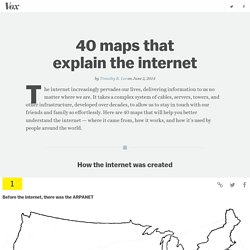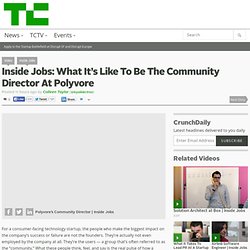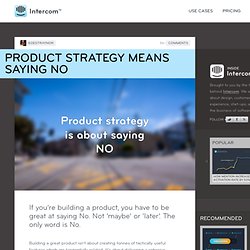

10 Significant Things You Likely Didn't Know About Social Media But Should. We love to make decisions and form strategies based on statistics.

It’s why we A/B test and how we change directions on our social sharing. Who doesn’t love a good statistic, especially one that has an actionable next step? You’re likely to find a sea of statistics for social media—I know I’m amazed at how many are out there. My favorite finds are those that are just a bit surprising or unique or even counterintuitive. I’ve saved some of the best social media stats I’ve found over the past few months and I’m happy to share them here with you. 1. When looking at your social media monitoring strategy, note that your brand/company mentions on social will likely not come from social’s biggest players. Social monitoring website Mention analyzed over 1 billion social mentions from the past two years, and in their analysis they found that 91% of mentions come from people with fewer than 500 followers. 2. 3. 4. 5. 6. 7. 8. 9.
Interactions represent the total of comments, shares, and likes. 40 maps that explain the internet. The internet increasingly pervades our lives, delivering information to us no matter where we are.

It takes a complex system of cables, servers, towers, and other infrastructure, developed over decades, to allow us to stay in touch with our friends and family so effortlessly. Here are 40 maps that will help you better understand the internet — where it came from, how it works, and how it's used by people around the world. How the internet was created Before the internet, there was the ARPANET Before the internet, there was the ARPANETARPANET, the precursor to the modern internet, was an academic research project funded by the Advanced Research Projects Agency, a branch of the military known for funding ambitious research projects without immediate commercial or military applications.
Initially, the network only connected the University of Utah with three research centers in California. Inside Jobs: What It’s Like To Be The Community Director At Polyvore. For a consumer-facing technology startup, the people who make the biggest impact on the company’s success or failure are not the founders.

They’re actually not even employed by the company at all. They’re the users — a group that’s often referred to as the “community.” What these people think, feel, and say is the real pulse of how a company’s product is performing out in the real world. For this week’s episode of Inside Jobs, I sat down with Nadia Hussain, the community director at Polyvore. Polyvore has attracted one of the largest fashion-focused communities on the web today with some 20 million monthly unique visitors worldwide, so the company’s community management team never has a dull moment.
Doing this means hours of emailing, chatting, and often speaking on the phone with people all over the world who use Polyvore. “I keep love letters on my desk. Product Strategy Means Saying No. If you’re building a product, you have to be great at saying No.

Not ‘maybe’ or ‘later’. The only word is No. Building a great product isn’t about creating tonnes of tactically useful features which are tangentially related. It’s about delivering a cohesive product with well defined parameters. As Apple’s latest advert points out, there are literally tens of thousands of permutations of your product based on every addition, both minor and major. So many reasons to say yes When your product gets traction, you’ll find yourself inundated with good ideas for features. But The Data Looks Good “We’ve tried this feature with a small group and engagement is off the charts.” But It’ll Only Take A Few Minutes The main problem with this argument is that the scope of work should never be a reason to include a feature in a product. Lots of bad ideas can be built quickly. But this customer is about to quit This is feature blackmail. But we can just make it optional This leads to death by preferences. Consumer.
Web & politics in France.